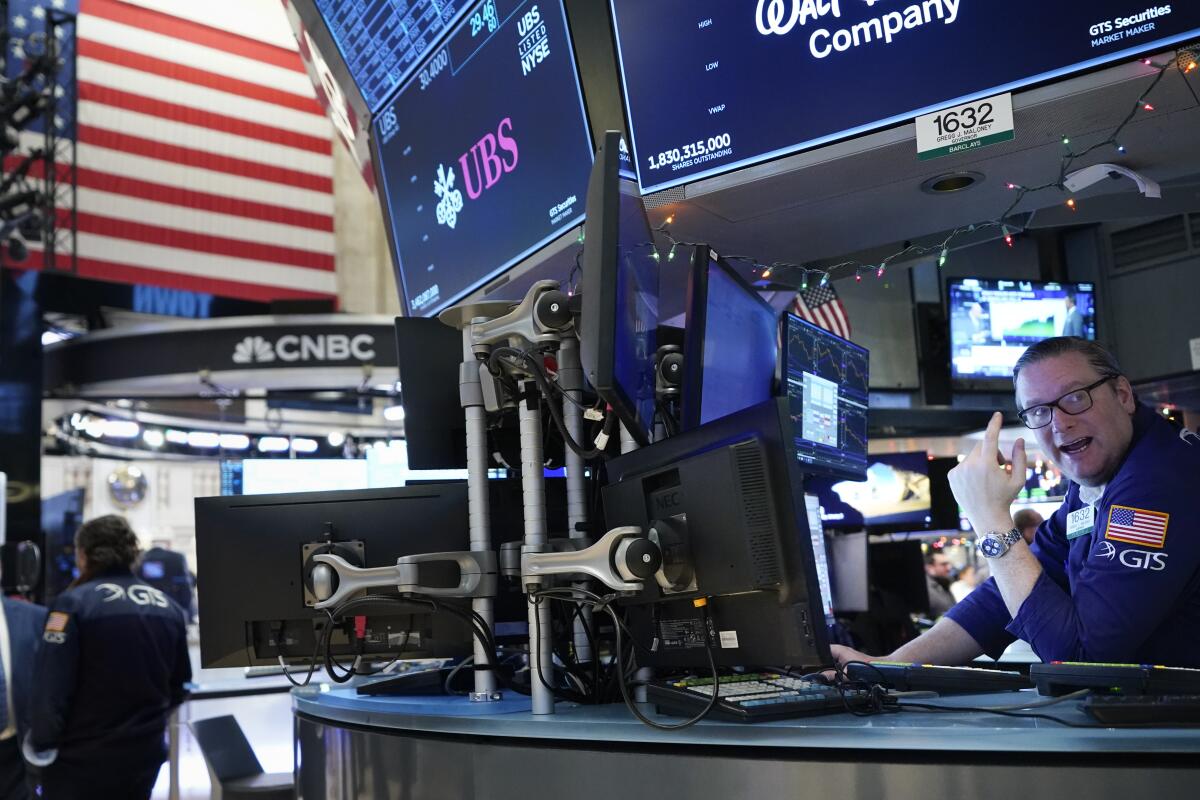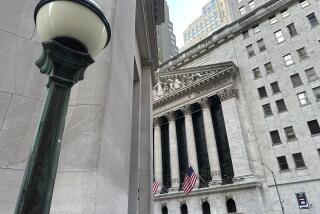Wall Street slips as Treasury yields rise

- Share via
Wall Street slipped Tuesday in a lackluster return to trading following a three-day holiday weekend.
The Standard & Poor’s 500 index fell 17.85 points, or 0.4%, to 4,765.98. The Dow Jones industrial average dropped 231.86 points, or 0.6%, to 37,361.12, and the Nasdaq composite sank 28.41 points, or 0.2%, to 14,944.35.
Spirit Airlines lost 47.1% after a U.S. judge blocked its takeover by JetBlue Airways on concerns it would mean higher airfares for flyers. JetBlue rose 4.9%.
Stocks of banks were mixed, meanwhile, as earnings reporting season ramps up for the final three months of 2023. Morgan Stanley sank 4.2% after it said a legal matter and a special assessment knocked $535 million off its pretax earnings , while Goldman Sachs edged up 0.7% higher after reporting quarterly results that topped Wall Street’s forecasts.
Companies across the S&P 500 are likely to report meager growth in profits for the fourth quarter from a year earlier, if any, if Wall Street analysts’ forecasts are to be believed. Earnings have been under pressure for more than a year because of rising costs amid high inflation.
But optimism is higher for 2024, in which analysts are forecasting a strong 11.8% growth in earnings per share for S&P 500 companies, according to FactSet. That, plus big expectations for several cuts to interest rates by the Federal Reserve this year, has helped the S&P 500 rally to 10 winning weeks in the last 11. The index remains within 0.6% of its all-time high set two years ago.
Bosses say workers are a little rusty with in-person conduct now that they’re back in the office. So companies are sending employees to etiquette classes.
Treasury yields have sunk sharply in the bond market on expectations for upcoming cuts to rates, which traders believe could begin as early as March. It’s a sharp turnaround from the last couple of years, when the Fed was hiking interest rates drastically in hopes of getting high inflation under control.
Easier rates and yields relax the pressure on the economy and financial system, while also boosting prices for investments. And for the last six months, interest rates have been the main force moving the stock market, said Michael Wilson, a strategist at Morgan Stanley.
He sees that dynamic continuing in the near term, with the “bond market still in charge.”
For now, traders are penciling in many more cuts to rates through 2024 than the Fed itself has indicated. That raises the potential for big market swings around each speech by a Fed official or economic report.
Yields rose in the bond market after Fed Gov. Christopher Waller said in a speech that “policy is set properly” on interest rates. Following the speech, traders pushed some bets for the Fed’s first cut to rates to happen in May instead of March.
Waller did say that cooling data reports have “made me more confident than I have been since 2021 that inflation is on a path” down to the Fed’s 2% target and that the central bank should cut rates this year “as long as inflation doesn’t rebound and stay elevated.”
Until then, though, Waller said the economy is doing well, which gives the Fed the ability to wait and monitor incoming data before making its next move. “We can take our time to make sure we do this right,” he said.
The yield on the 10-year Treasury climbed to 4.06% from 3.95% late Friday. Higher yields can be a drag on corporate profits, among other negatives for investors, though the 10-year yield is still well below the 5% level it reached in October.
Oxfam International says the world could have its first trillionaire within a decade. Elon Musk, Jeff Bezos and Larry Ellison are all candidates.
On Wall Street, Boeing fell to one of the market’s sharper losses as worries continue about troubles for its 737 Max 9 aircraft following the recent in-flight blowout of an emergency exit door panel on an Alaska Airlines jet. Boeing lost 7.9%.
On the winning side was Carrols Restaurant Group, the largest Burger King franchisee in the U.S., which jumped 12.5%. Restaurant Brands International said it will buy all the stock of Carrols that it doesn’t already own for $9.55 per share in cash.
Stock markets abroad were also mostly lower, including Japan’s, which had been on a winning streak that had carried it to its highest level since its bubble was deflating in 1990.
The Nikkei 225 slipped 0.8% after the value of the Japanese yen strengthened against other currencies. A stronger yen can sap profits from Japanese exporters, and it rose with expectations that the Bank of Japan could be preparing to end its long-standing policy to keep interest rates below zero.
AP writers Matt Ott and Elaine Kurtenbach contributed to this report.
More to Read
Inside the business of entertainment
The Wide Shot brings you news, analysis and insights on everything from streaming wars to production — and what it all means for the future.
You may occasionally receive promotional content from the Los Angeles Times.












